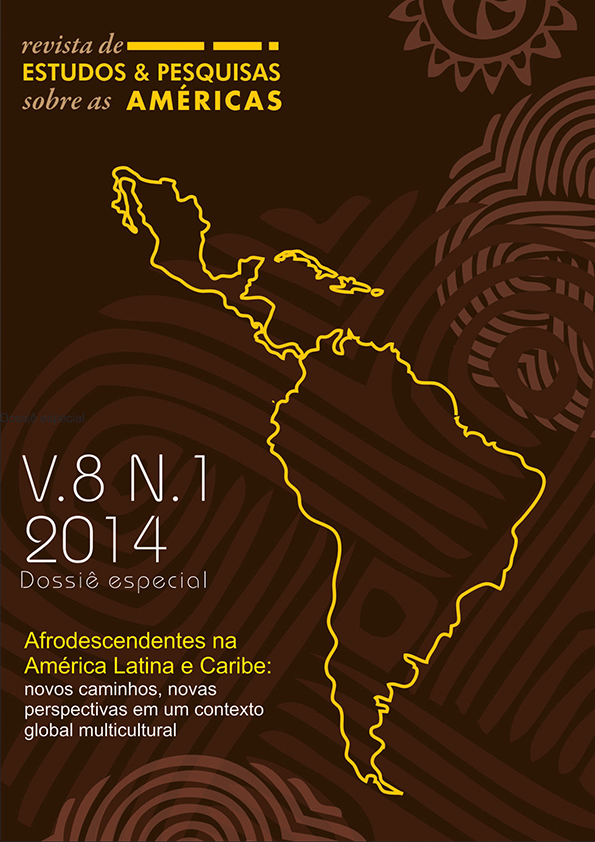¿CÓMO SE CUENTA Y POR QUÉ? Institucionalización censal y poblaciones afrocentroamericanas, (1940-1960)
Abstract
Hacia mediados del siglo XX, los Estados nacionales centroamericanos contaban ya con varias décadas de experiencia en la sistematización de los registros censales y estadísticas vitales de sus respectivas poblaciones nacionales. Dicho periodo reviste un interés central, en términos históricos, si tomamos en consideración la conjunción del fin de la II Guerra Mundial y con esta, el comienzo de una nueva era en cuanto a Derechos Humanos se refiere. En este sentido, nuestro interés se centra en analizar, desde una perspectiva comparada, las motivaciones y las políticas detrás del levantamiento de los censos en Guatemala, Honduras, Nicaragua, Costa Rica y Panamá, entre 1940 y 1960; particularizando el interés sobre la diversidad poblacional, específicamente sobre las poblaciones afrodescendientes de cada país y su 113Â balance a nivel regional; así como la relación y la influencia de la dinámica internacional, concretamente el rol que el desarrollo de los Derechos Humanos pudo haber jugado en los respectivos conteos, y/o la incidencia que otros factores pudieron haber tenido en la definición de prioridades al momento del levantamiento de los censos en dichos países de la región centroamericana.
Palabras clave: Afrodescendientes/Negros, Centroamérica, Censos, Derechos Humanos, Institutos de Estadística.
 ---
Como se conta e por quê? A institucionalização do censo e populações afrocentroamericanas (1940-1960)
Em meados do século XX, os Estados nacionais centroamericanos já contavam com várias décadas de experiência na sistematização de dados censitários e estatísticas vitais de suas respectivas populações nacionais. Tal período reveste-se de um interesse central, em termos históricos, se tomamos em consideração a conjunção do final da II Guerra Mundial e o começo de uma nova era fundamentada nos Direitos Humanos. Nesse sentido, nosso interesse está em analisar, desde uma perspectiva comparada, as motivações e as políticas que envolvem os levantamentos censitários na Guatemala, Honduras, Nicarágua, Costa Rica e Panamá, entre 1940 e 1960; detalhando o interesse relacionado à diversidade populacional, especificamente à s populações afrodescendentes de cada país e sua apreciação no âmbito regional; assim como a relação e a influência da dinâmica internacional, concretamente, o papel que o desenvolvimento dos Direitos Humanos pode ter tido nos respectivos levantamentos, e/ou a incidência que outros fatores puderam ter tido na definição das prioridades no momento do levantamento censitário nesses países da região centro-americana.
Palavras chave: Afrodescendentes/Negros, América Central, Censos, Direitos Humanos, Institutos de Estatística.
---
How is it calculated and why? The institutionalization of the census and the afrocentralamerican populations (1940-1960)
In the mid-twentieth century, Central American national states had already decades of experience in the systematization of census data and vital statistics of their respective populations. In historical terms, this period is of real importance, if we consider the end of World War II and the beginning of a new era grounded on Human Rights. Thus, our interest is to examine, from a comparative perspective, the motivations and policies involving the censuses in Guatemala, Honduras, Nicaragua, Costa Rica and Panama between 1940 and 1960; laying out any interest related to population diversity, specifically at African descent populations of each country and their 113 level of regional balance; as well as the relationship and the influence of international dynamics, particularly, the role that the development of human rights may have had in their surveys, and/or extent that other factors might have had in setting priorities at the time of the census in these countries the central American region.
Keywords: African Descent/Black, Central America, Census, Human Rights, Statistical Institutes.
Downloads
Downloads
Published
How to Cite
Issue
Section
License
The published material is the property of the Journal, and may be reproduced in whole or in part with indication of the source.
Copyright: Authors will be responsible for obtaining the copyright of the material used. Authors who publish in this journal agree to the following terms:
a)Authors retain the copyright and grant the journal the right of first publication, with the work simultaneously licensed under
the Creative Commons Attribution License which allows the sharing of work with acknowledgment of authorship and initial publication in this journal.
b) Authors are authorized to take additional contracts separately, for non-exclusive distribution of the version of the work published in this journal (eg, publish in institutional repository or as a book chapter), with acknowledgment of authorship and initial publication in this journal.
c) Authors are allowed and encouraged to publish and distribute their work online (eg in institutional repositories or on their personal page) at any point before or during the editorial process, as this can generate productive changes as well as increase the impact and the citation of the published work (See The Effect of Free Access).
















